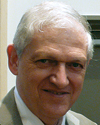Columbia University’s first forum on construction-project leadership was built around the theme that project success requires leadership in addition to management. The forum drew more than 100 industry professionals to the New York City campus on Aug. 25.
Prevailing theories of project management are often inadequate because they largely ignore the dynamic environment of projects, particularly construction projects, said Alexander Laufer, director of the university’s Center for Project Leadership. Laufer, a professor of civil engineering at the Technion-Israel Institute of Technology in Haifa, is a visiting professor at Columbia and established the center there last year.
“For years, theorists have talked about rethinking project management,” Laufer said, while project after project continues to have poor results. One problem he identifies is a “persistent gap between the rigor of research methodology and the relevance of the research question.” The center’s philosophy is to work in close collaboration with industry to ensure that theories it develops will be useful and that practices and processes it advocates will be effective. The forum was part of that outreach.
| Management | Leadership |  ALEX LAUFER. COLUMBIA UNIVERSITY | |
|---|---|---|---|
| PRODUCT | Order | Change | |
| APPLIED | Continuously | Infrequently | |
| INFLUENCE | Routine matters | Non-routine matters | |
| FOCUS | Technical problems | Adaptive problems |
Jeffrey S. Russell, chair of the Dept. of Civil Engineering at the University of Wisconsin, Madison, and Norman R. Doll, an adjunct professor at the same school and president emeritus of Pieper Electric Inc., Milwaukee, discussed their leadership research and efforts to teach leadership to students.
The team studied the work of Jim Collins in his book “Good to Great,” which identified unexpected attributes of leaders, such as humility and a willingness to put the needs of the organization ahead of their own. Would the same leadership qualities be present in successful, regional construction companies?
 JEFFREY S. RUSSELL |  NORMAN R. DOLL | Studied the ‘Good to Great’ qualities: A combination of humility and a tremendous personal will to get the job done. |
Doll pointed out the work is qualitative and values-focused and that results are preliminary. But, he said, the construction leaders had a “significant focus on people with an emphasis on the right people—and that they lead by example.”
Russell said Wisconsin’s program delivers theories and skills in the classroom but also project-based experiences. “Planning is important but you must learn to be adaptive and flexible,” he said. For example, in a project to develop a method to remove excess fluoride from drinking water that was causing skeletal deformities in a village in Kenya, students found that bone-char filtration could solve the problem technically but presented cultural obstacles.
 SCOTT CAMERON PROTECTOR & GAMBLE | To what extent do I empower others? Does my behavior reflect my respect for others? Am I consistent in demanding high quality for myself and for others? How does my behavior affect the spirit of others? How do I foster teamwork? How do I encourage learning? How would I feel if I were the recipient of my behavior? |
Scott Cameron, global project management process owner for Procter & Gamble, gave the group a self-check on leadership skills, inviting audience members to grade themselves from one to five on a list of questions about their leadership style (see box). He also described the five “E’s” of “effective” leaders, who “envision, engage, energize, enable and execute.” Project managers too often focus only on executing, also called “transactional leadership,” Cameron said. At the top are “inspirational” project leaders, who bring attributes such as strategic focus, lateral thinking, courage, commitment and accessibility, he added.
Speakers and attendees also debated whether or not leadership can be taught in class. Terry Little, a consultant with Spectrum Group, Alexandria, Va., contended that leaders are “made” by the mentoring they get from their leaders. Laufer compared leadership to a muscle that “improves with practice, training and reflection.” But Russell countered that a blend of formal academic education and real-world, practical experience is needed. “It’s extremely important that we articulate that we expect students some day to become leaders,” he said.



Post a comment to this article
Report Abusive Comment